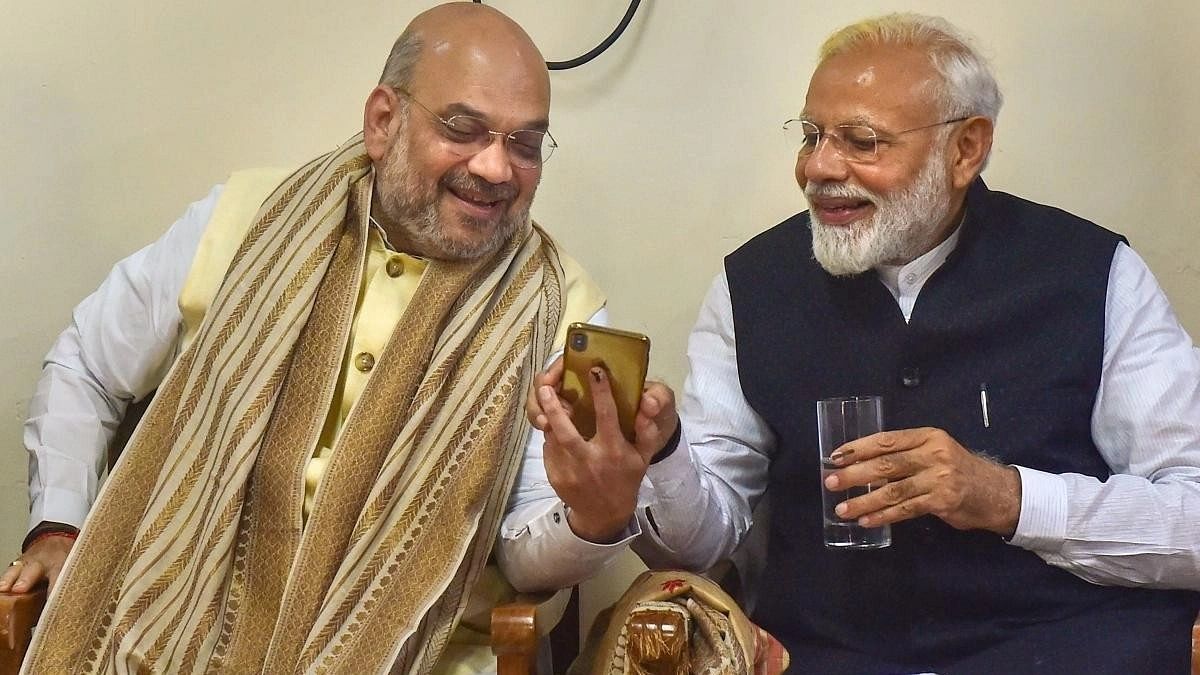
Union Home Minister Amit Shah and Prime Minister Narendra Modi.
Credit: PTI File Photo
New Delhi: Hailing the Supreme Court's verdict upholding the government's decision to abrogate Article 370 of the Constitution as 'historic', Prime Minister Narendra Modi asserted on Monday that it is not just a legal judgment, but a 'beacon of hope' and a testament to the collective resolve to build a stronger and more united India.
The Supreme Court on Monday upheld the government's decision to abrogate Article 370, which bestowed a special status on the erstwhile state of Jammu and Kashmir, and said steps should be taken to conduct the election to the Union Territory's Assembly by September 30 next year.
The apex court also directed that statehood to the Union Territory of Jammu and Kashmir be restored at the earliest.
In a post on X, Modi said the Supreme Court verdict on the abrogation of Article 370 is 'historic' and constitutionally upholds the decision taken by Parliament on August 5, 2019.
"It is a resounding declaration of hope, progress and unity for our sisters and brothers in Jammu, Kashmir and Ladakh. The court, in its profound wisdom, has fortified the very essence of unity that we, as Indians, hold dear and cherish above all else," he said.
"I want to assure the resilient people of Jammu, Kashmir and Ladakh that our commitment to fulfilling your dreams remains unwavering,' the prime minister added."
"We are determined to ensure that the fruits of progress not only reach you but also extend their benefits to the most vulnerable and marginalised sections of our society who suffered due to Article 370," he asserted.
The verdict is not just a legal judgment, it is a beacon of hope, a promise for a brighter future and a testament to the collective resolve to build a stronger, more united India, the prime minister said on the microblogging platform, using the hashtag 'NayaJammuKashmir'.
Union Home Minister Amit Shah also welcomed the Supreme Court verdict to uphold the government's decision to abrogate Article 370, saying the ruling has proved that the August 5, 2019 decision was 'completely constitutional'.
In a series of posts on X soon after the Supreme Court verdict, Shah, the architect of the entire move to abrogate Article 370, said Prime Minister Narendra Modi took a visionary decision five years ago that brought peace and normalcy in Jammu and Kashmir.
“I welcome the Honourable Supreme Court of India's verdict upholding the decision to abolish Article 370. On August 5, 2019, PM Narendra Modi took a visionary decision to abrogate Article 370. Since then peace and normalcy have returned to J&K,” he said.
The home minister said growth and development have brought new meaning to human life in the valley, which was once torn by violence.
He said prosperity in the tourism and agriculture sectors has raised the income levels of the residents of both Jammu, Kashmir and Ladakh.
“Today, the Supreme Court's verdict has proved that the decision to abrogate Article 370 was completely constitutional,” he wrote on X with the hashtag #NayaJammuKashmir.
Shah said after the abrogation of Article 370, the rights of the poor and deprived have been restored, and separatism and stone pelting are now things of the past.
The entire region now echoes with melodious music and cultural tourism and the bonds of unity have strengthened, and Jammu and Kashmir's integrity with ‘Bharat’ stands reinforced.
“It is once again the Jammu, Kashmir, and Ladakh that always belonged to our nation and will continue to be so,” he said.
Shah said under the leadership of Prime Minister Modi, the NDA government is committed to establishing lasting peace in Jammu, Kashmir and Ladakh and the all-round development of the region.
“Whether it is boosting the local economy with new incentives, building state-of-the-art educational infrastructure, or empowering the poor with welfare benefits, we will continue to exert all our might for the region,” the home minister said.
Writing the judgment for himself and Justices B R Gavai and Surya Kant, Chief Justice of India (CJI) D Y Chandrachud said Article 370 was a temporary provision in the Constitution and the president had the power to revoke it.
The court also upheld the validity of the decision to carve out the Union Territory of Ladakh from Jammu and Kashmir on August 5, 2019. On that day, the government abrogated the provisions of Article 370 and bifurcated the state into the Union territories of Jammu and Kashmir and Ladakh.
The erstwhile state does not have internal sovereignty different from the other states, the CJI said.